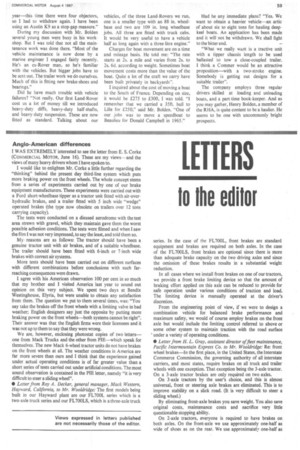Anglo-American differences I WAS EXTREMELY interested to see the letter from E. S. Corke
Page 61

If you've noticed an error in this article please click here to report it so we can fix it.
(COMMERCIAL MOTOR, June 16). These are my views and the views of many heavy drivers whom I have spoken to.
I would like to enlighten Mr. Corke a little further regarding the "thinking" behind the present day third-line system which puts more braking power on the front wheels. The whole concept stems from a series of experiments carried out by one of our brake equipment manufacturers. These experiments were carried out with a Ford short-wheelbase tipper as a tractor unit fitted with air-overhydraulic brakes, and a trailer fitted with 5 inch wide "wedge" operated brakes (the type now obsolete on trailers over 12 tons carrying capacity).
The tests were conducted on a disused aerodrome with the test area strewn with gravel, which they maintain gave them the worst possible adhesion conditions. The tests were filmed and when I saw the film! was not very impressed, to say the least, and told them so.
My reasons are as follows: The tractor should have been a genuine tractor unit with air brakes, and of a suitable wheelbase. The trailer should have been fitted with 6-inch or 7-inch wide brakes with correct air systems.
More tests should have been carried out on different surfaces with different combinations before conclusions with such farreaching consequences were drawn.
I agree with his American observation 100 per cent in so much that my brother and I visited America last year to sound out opinion on this very subject. We spent two days at Bendix Westinghouse, Elyria, but were unable to obtain any satisfaction from them. The question we put to them several times, was: "You say take the brakes off the front wheels with a limiting valve in bad weather; English designers say just the opposite by putting more braking power on the front wheels—both systems cannot be right". Their answer was that the English firms were their licensees and it was not up to them to say that they were wrong.
We are, however, enclosing photostat copies of two letters— one from Mack Trucks and the other from PIE—which speak for themselves. The new Mack 6-wheel tractor units do not have brakes on the front wheels at all. The weather conditions in America are far more severe than ours and I think that the experience gained under actual operating conditions is of far greater value than a short series of tests carried out under artificial conditions. The most sound observation is contained in the PIE letter, namely "it is very difficult to steer a sliding wheel".
• Letter from Roy A. Decker, general manager, Mack Western, Hayward, California, to Mr. Wooldridge: The first models being built in our Hayward plant are our FL700L series which is a two-axle truck series and our FL700LS, which is a three-axle truck












































































































